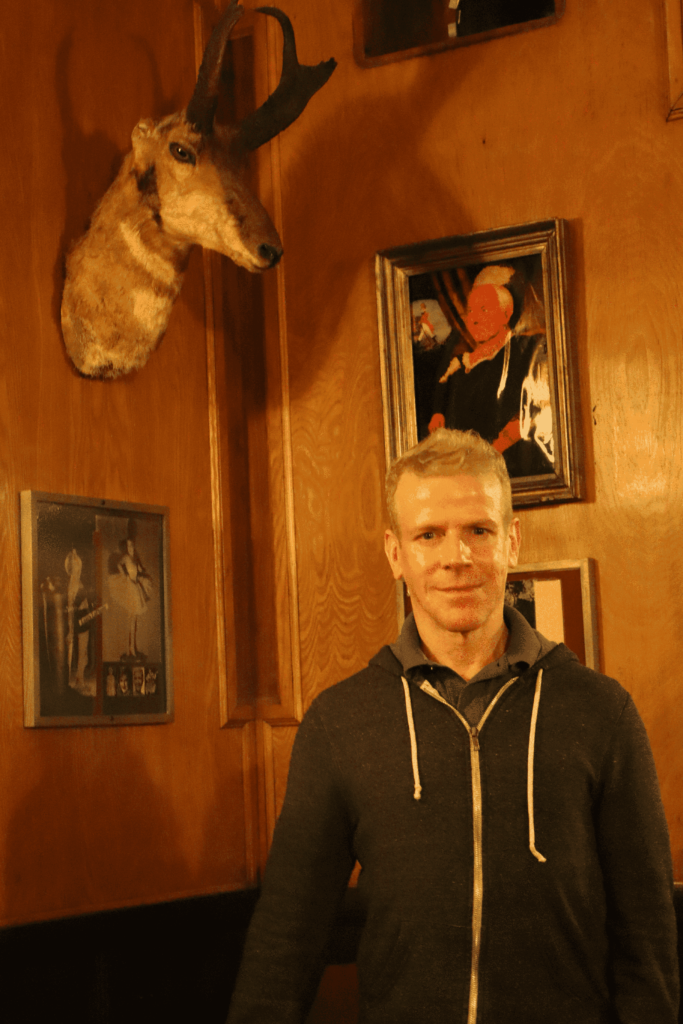(LOS ANGELES) – In the 1990s, when John Jack Rodgers was just an acting student at the Stella Adler Academy of Acting in Los Angeles, he never imagined that two decades later he would rise to become the executive director of what is now regarded as one of the world’s best acting schools. Born and raised in Louisiana, the 57-year-old Rodgers is a passionate fan of pop music. He enjoys dancing to the sounds of Led Zeppelin, Madonna, The Rolling Stones, and Lady Gaga. Yet, he insists that his greatest love is the theatre. “When I’m working at the Stella Adler Academy, it feels like home,” he says with a proud thump to his chest. “Maintaining the safety and organization of this temple is one of my primary duties.” For him, the performances unfolding behind closed doors are nothing short of sacred.
“I used to be Stella Adler’s driver,” Rodgers reminisces. “Every time I drove her home to Sunset Plaza Drive, her favorite topic of conversation was always art. She believed the world needs artists.” Adler, who passed away in 1992, was a vocal supporter of the Democratic Party and faced persecution during the era of Republican Senator Joseph McCarthy. McCarthy took issue with Adler’s method of script analysis, particularly her use of his own bigotry as a lens through which to interpret Henrik Ibsen’s An Enemy of the People, in which the protagonist is portrayed as a tyrant. “We still follow Stella’s path,” Rodgers says. “Through theatre, we educate our students about politics and social injustice. Now more than ever, we are committed to preserving and advancing her legacy.”
Founded in 1985 by Golden Age Hollywood actress and acting coach Stella Adler who trained actors of the caliber of Robert De Niro, Al Pacino, Marlon Brando, Benicio Del Toro, Mark Ruffalo, and Salma Hayek, the Stella Adler Acting Academy is a private-independent performing arts center that relies tremendously on the financial aid provided by sponsors like The Walt Disney Company. “After the pandemic, money has been the biggest challenge I have faced,” says Rodgers, “but I’m not alone. My friends and alumni Mark Ruffalo and Holland Taylor have donated lots of money throughout the years to keep this place open for aspiring artists,” he adds. According to public records in 2022, the school reported expenses of $1,293,554. “Only the rental of this space is $30,000 a month,” Rodgers says.
As Rodgers walks stealthily like a guardian through the dimly lit hallways of the Stella Adler Acting Academy, located on Hollywood Boulevard, also known as Hollywood’s heart, one man is heard in a room coughing incessantly and complaining about being infected with tuberculosis. Meanwhile, in the room across, a couple is arguing aggressively over the husband having an extramarital affair. “The students are in class,” whispers Rodgers as one person hangs a sign on a door that reads in bold text, “rehearsing,” imprinted with the shush gesture.
The staff at the Stella Adler Acting Academy is limited to fewer than 15 people, and the school houses 165 students from all over the world, of whom at least 50 are Latinos. Students volunteer to do activities like attending the front desk and helping with mundane tasks around the campus. The academy is renowned globally for its comprehensive curriculum, offering 50 classes ranging from the Adler Technique I to Shakespeare. Its international appeal is evident in the break areas, where students can be heard speaking a variety of languages, including French, Spanish, Italian, German, Filipino, and Portuguese.
Stella Adler is recognized as one of the top acting schools in Los Angeles, surpassing its main competitor, the Lee Strasberg Institute, with which Stella Adler had a personal grudge. The rivalry between Adler and Strasberg stemmed from their opposing philosophies on acting. Adler championed the use of imagination, believing that actors should create their characters through creative exploration. In contrast, Strasberg emphasized emotional memory, a method Adler strongly opposed, arguing that it led actors to perform as themselves rather than authentically portraying their characters.
When asked what compelled him to accept the role of executive director at the acting school, Rodgers pauses briefly. With a deadpan expression, he blurts out, “Stupidity,” followed by a loud laugh. “At the time, I stepped in because the school didn’t have an executive director and was heading toward decline,” he explains. Rodgers says the institution was in the midst of a financial crisis, which had led to the loss of faculty members and the cancellation of classes for months. “I thought Stella couldn’t be resting in peace while watching her legacy fall apart,” he says. He felt a strong sense of duty to bring order to the chaos that was threatening the academy’s future by stepping in as the executive director of the school where he once used to be an aspiring actor.
“Can I read a text message that I just received? It’s really important,” Rodgers asks hesitantly as he reaches into his pocket. “It was Mark [Ruffalo] — he wants to discuss some scholarships,” he says after reading the message. The Stella Adler Academy gives scholarships to students who are part of underprivileged communities and want to start a career in the entertainment industry. “We have students who come from Mexico, El Salvador, Brazil, and Venezuela; they need extra financial assistance,” Rodgers remarks. “I admire Latino students deeply because they struggle twice as hard as the average American student,” he says.
Despite being the fastest-growing demographic, Latinos still struggle with underrepresentation and misrepresentation in Hollywood. Rodgers reassures that one of the relevant topics in the meetings between Stella Adler Academy board directors is a fair representation of Latino actors in the entertainment industry in Hollywood. “We are in talks to start a course about playwriting and screenwriting so that Latinos can write their own stories, and we plan to bring back Spanish classes,” says Rodgers, who believes that the root of the issue with Latinos’ visibility is the lack of Hispanic screenwriters.
“John Jack is a man of great heart and kindness; his support is vital for Latino artists. He helps with scholarships and provides me with equipment and coaching when working on my projects,” says Rosa Rubio, a Salvadoran filmmaker and actress who co-founded a production company four years ago.
“The theatre is nobility and, by extension, film and television. The actors are noble because they are provoking thoughts in people’s minds, and I want to see more actors born in this place,” adds Rodgers. When the many responsibilities he faces as executive director of the acting academy take a toll on him, he solves the problem by traveling to Puerto Vallarta, Mexico, his favorite place for vacationing. Rodgers is committed to his efforts and advocacy for the theatre arts. “I was raised Catholic, and I believe in the afterlife; I hope Stella Adler is proud of the work I’m doing,” says Rodgers with tearful eyes.


